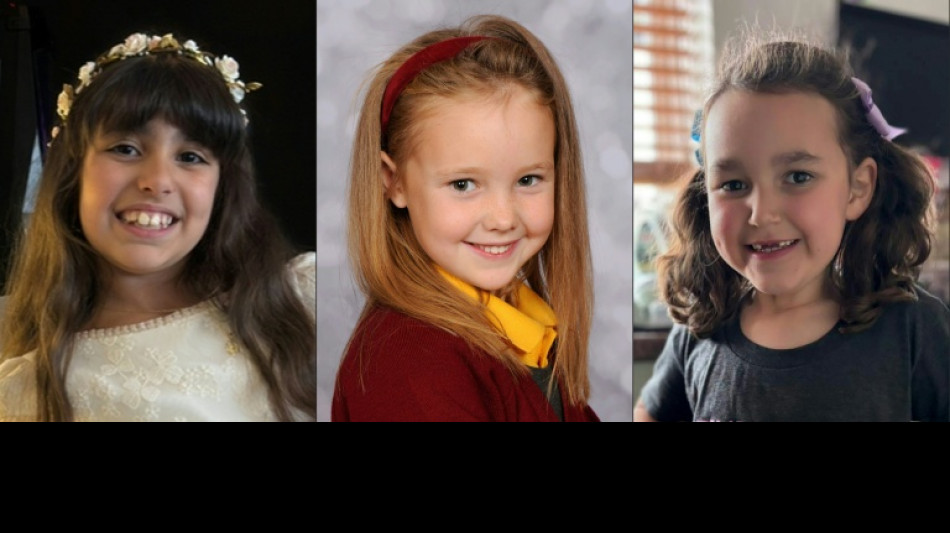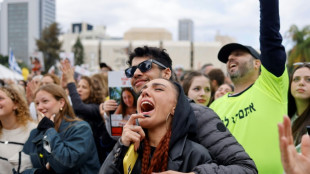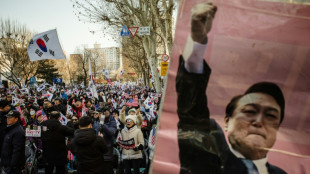

'Shattered souls': tears as horror of stabbing spree retold at UK court
The families of children killed and wounded by a teenager in a UK knife rampage wept in court Thursday as they relived the chilling details of a frenzied attack on a girls' dance class.
Sobs and gasps were heard as prosecutor Deanna Heer set out details of the stabbing spree by violence-obsessed Axel Rukadubana, who attacked the class last July in Southport, northwestern England.
Rudakubana, then 17, was heard to say: "I'm glad they're dead," after he was arrested, Deanna Heer for the prosecution told the court.
She described how he burst into the studio in the seaside resort where a group of young girls were sitting on the floor making bracelets, listening to Swift's blockbuster songs.
After his arrest, police found violent content on Rudakubana's devices including images of dead bodies, victims of torture, beheadings, cartoons depicting killing, violence and rape or which insulted or mocked different religions.
On the day of the July killings, Heer said, Rudakubana searched online for information about a stabbing at a Sydney church earlier in the year.
He then travelled to the dance class venue by taxi armed with a 20-centimetre-long (eight-inch) kitchen knife.
"Within 30 seconds, screams can be heard coming from within, followed by children fleeing from the building," Heer said.
Rudakubana, now 18, has confessed to killing the three girls who died in the attack -- Bebe King, aged six, Elsie Dot Stancombe, seven, and nine-year-old Alice da Silva Aguiar.
"Our dream girl has been taken away in such a horrible, undeserving way that it shattered our souls," Aguiar's parents said in a statement to the court.
Stancombe's mother branded her daughter's killer as "cruel and evil", saying his actions were those of "a coward".
Rudakubana was to be sentenced later Thursday but was twice ordered out of court by the judge after repeatedly shouting about feeling ill.
- Living nightmare -
Heer said that on July 29, dance teacher Heidi Liddle was sitting on the floor helping to make bracelets when she saw Rudakubana enter and begin "lunging through the children".
She started pushing them towards the exit but after one of the girls ran towards the toilet she followed her and locked the door.
"Outside, they could hear children screaming, and then the door rattled. When she heard voices outside the door crying for the defendant to stop she realised that not all of the children had managed to escape," Heer said, adding that some were stabbed in the back as they fled.
Some relatives in the public gallery were in tears. Others sat with their heads in their hands and wiped their eyes as tough security camera footage showed frightened, screaming children fleeing the scene.
In victim impact statements read to the court, one 14-year-old survivor who was stabbed in the arm said the day turned into a "living nightmare".
"The thing I remember most about you (Rudakubana) is your eyes. You didn't look human, you looked possessed," she said.
Class instructor Leanne Lucas, 36, who was also injured, said since the attack she could no longer be alone at home, go to work or walk down the street without glancing back.
"The impact this has had on me can be summed up by one word: trauma," she said.
"He targeted us because we were women and girls, vulnerable and easy prey," she added.
Rudakubana has also pleaded guilty to 10 counts of attempted murder -- of eight children and two adults -- and possessing a blade.
And he admitted producing a biological toxin -- ricin -- and possessing an Al-Qaeda training manual. Judge Julian Goose warned Rudakubana after his guilty pleas on Monday that he faced a long custodial sentence.
- 'I feel ill' -
Arriving in court earlier Thursday, Rudakubana said, "I'm not fine, I feel ill", urging the judge "don't continue", adding he had not eaten for 10 days.
The judge told the court he had been assured Rudakubana was fine to attend, and allowed a doctor to examine him after ordering him from the court for shouting.
The teenager's rampage triggered a wave of revulsion in the UK.
But viral misinformation that the perpetrator was a Muslim asylum seeker sparked anti-immigrant riots in more than a dozen English and Northern Irish towns and cities.
Rudakubana was in fact born in Cardiff to parents of Rwandan origin, and lived in Banks, a village northeast of Southport.
His Christian church-going parents, both ethnic Tutsis, came to Britain in the years after the 1994 Rwandan genocide. Their church has said they are now in hiding for their protection.
The attack has not been treated as a terror incident and he was never charged with terrorism offences -- prompting criticism from some.
A public inquiry has been announced to probe how police, courts and welfare services "failed to identify the terrible risk and danger to others that he posed," interior minister Yvette Cooper said.
Rudakubana was referred three times to the government's nationwide anti-extremism scheme, Prevent, over concerns about his obsession with violence.
He had also been excluded from school, with reports suggesting that when he was 13 he was bullied and had started carrying a knife.
A.W.Flammang--LiLuX



